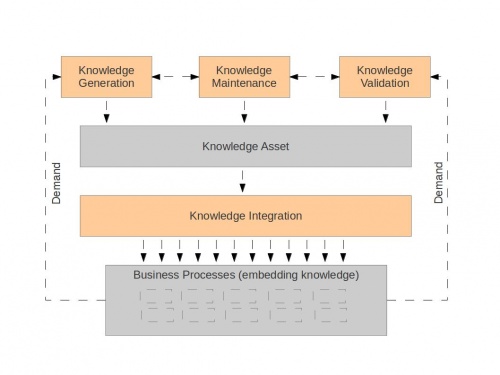Difference between revisions of "Knowledge process"
DavidBeraha (Talk | contribs) (→Description) |
DavidBeraha (Talk | contribs) (→Description) |
||
| Line 18: | Line 18: | ||
==Description== | ==Description== | ||
| − | [[File: | + | [[File:Knowledge processes 10.png|thumb|right|500px|Fig 1. A categorization of major knowledge processes]] |
| − | [[File: | + | [[File:Processes.png|thumb|right|500px|Fig 2. Main knowledge processes]] |
| − | [[File: | + | [[File:Knowledge_processes.jpg|thumb|right|500px|Fig 3. Relationship of Knowledge and Business processes]] |
| + | |||
There are many different descriptions of knowledge processes found in the literature. However, for [[Nuclear knowledge management]] purposes the knowledge processes may be structured into nine categories as depicted in fig. 1. The prevalent and most widely used categories are the ones by which knowledge is [[Generation|generated]], [[Validation|validated]], [[Maintenance|maintained]] and [[Integration|integrated]] in organizations, as depicted in fig. 2. Knowledge processes support business processes; their relation is depicted in fig. 3. | There are many different descriptions of knowledge processes found in the literature. However, for [[Nuclear knowledge management]] purposes the knowledge processes may be structured into nine categories as depicted in fig. 1. The prevalent and most widely used categories are the ones by which knowledge is [[Generation|generated]], [[Validation|validated]], [[Maintenance|maintained]] and [[Integration|integrated]] in organizations, as depicted in fig. 2. Knowledge processes support business processes; their relation is depicted in fig. 3. | ||
Revision as of 13:46, 15 February 2014
Template:DavidBerahaDefinition
Knowledge process is Knowledge process is a process that acts on /or with knowledge, either individual knowledge or organizational knowledge.
Summary
Knowledge processes include knowledge generation, validation, maintenance and integration activities with sub processes like acquiring, transforming, developing, disseminating, using, sharing and preserving knowledge as a way to meet specified internal demand that can ultimately improve organizational learning. In this regard, knowledge processes help an organization to gain insight and understanding from best practices.
Description
There are many different descriptions of knowledge processes found in the literature. However, for Nuclear knowledge management purposes the knowledge processes may be structured into nine categories as depicted in fig. 1. The prevalent and most widely used categories are the ones by which knowledge is generated, validated, maintained and integrated in organizations, as depicted in fig. 2. Knowledge processes support business processes; their relation is depicted in fig. 3.
The table of knowledge processes provides an extensive list of knowledge processes and their categorization.





